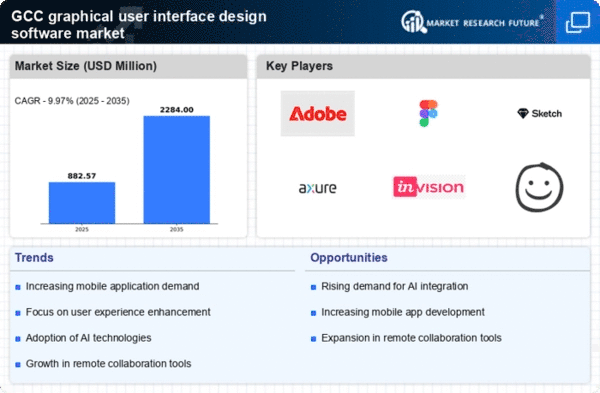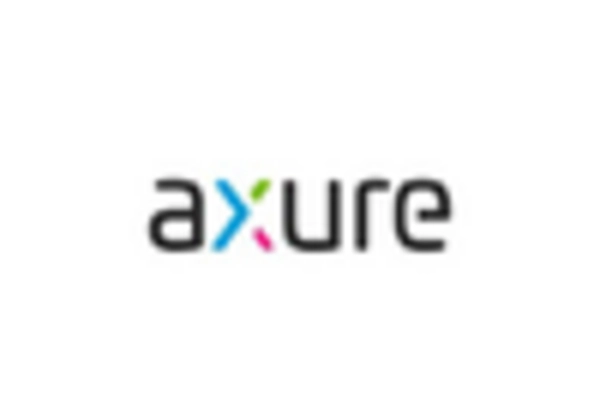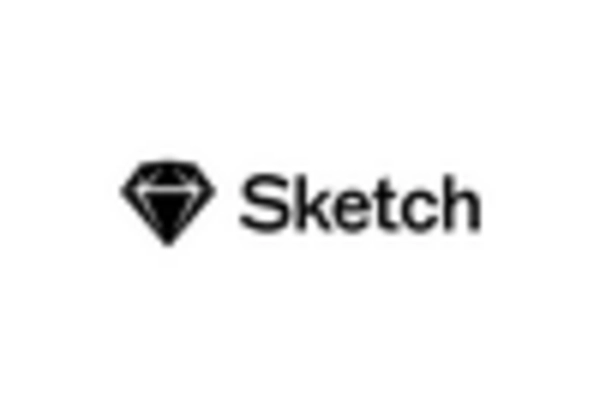Emergence of Remote Work Culture
The emergence of a remote work culture in the GCC is reshaping the graphical user-interface-design-software market. As organizations adapt to flexible work arrangements, there is a heightened need for software that facilitates collaboration and communication among remote teams. Graphical user-interface-design-software that supports virtual collaboration tools is becoming increasingly important. The market for collaboration software is projected to grow by 20% in the next few years, reflecting the demand for solutions that enhance remote work experiences. Companies are investing in user-friendly interfaces that allow for seamless interaction and project management, thereby driving the growth of the graphical user-interface-design-software market. This shift towards remote work is likely to continue influencing design trends and software development in the region.
Expansion of E-Commerce Platforms
The rapid expansion of e-commerce platforms in the GCC is significantly influencing the graphical user-interface-design-software market. With online shopping becoming increasingly popular, businesses are prioritizing the development of user-friendly interfaces to attract and retain customers. The e-commerce sector in the GCC is projected to grow at a CAGR of 12% from 2025 to 2030, indicating a robust market for graphical user-interface-design-software. Companies are recognizing the importance of effective UI design in enhancing the shopping experience, leading to higher conversion rates. As a result, investments in graphical user-interface-design-software are expected to rise, as businesses strive to create visually appealing and functional online stores that cater to the evolving preferences of consumers.
Increased Focus on Data Visualization
The growing emphasis on data visualization in the GCC is influencing the graphical user-interface-design-software market. As organizations accumulate vast amounts of data, the need for effective visualization tools becomes paramount. Businesses are increasingly adopting graphical user-interface-design-software that enables them to present data in a clear and engaging manner. This trend is particularly relevant in sectors such as finance and healthcare, where data-driven decision-making is critical. The market for data visualization tools is expected to grow by approximately 15% annually in the GCC, indicating a strong demand for software that enhances the user experience through effective data representation. Consequently, the graphical user-interface-design-software market is likely to benefit from this increased focus on data visualization.
Rising Demand for Mobile Applications
The increasing reliance on mobile devices in the GCC region is driving the graphical user-interface-design-software market. As businesses seek to enhance their mobile presence, the demand for intuitive and visually appealing mobile applications has surged. This trend is reflected in the projected growth of mobile app revenues, which are expected to reach approximately $1.5 billion by 2026 in the GCC. Consequently, software solutions that facilitate the design of user-friendly interfaces for mobile applications are becoming essential. Companies are investing in graphical user-interface-design-software to create seamless experiences across various platforms, thereby enhancing customer engagement and satisfaction. This rising demand for mobile applications is likely to propel the growth of the graphical user-interface-design-software market in the region.
Government Initiatives Supporting Digital Transformation
Government initiatives aimed at promoting digital transformation in the GCC are playing a crucial role in the growth of the graphical user-interface-design-software market. Various governments in the region are implementing strategies to enhance digital infrastructure and encourage innovation. For instance, the UAE's Vision 2021 emphasizes the importance of a knowledge-based economy, which includes investments in technology and software development. This supportive environment is likely to stimulate demand for graphical user-interface-design-software as businesses seek to align with government objectives. The emphasis on digital services and e-governance is expected to create opportunities for software providers, thereby driving the growth of the graphical user-interface-design-software market.
















